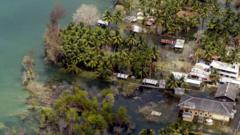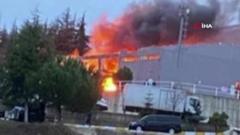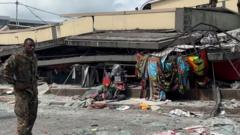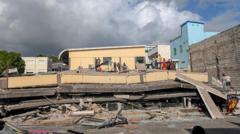Following the 2023 earthquake that resulted in the collapse of the Isias Grand hotel and the death of 72 individuals, Turkish authorities have sentenced the building's owner and architect to significant prison terms for their negligence. While the sentences have been deemed inadequate by some officials, the court's actions reflect ongoing scrutiny of construction standards and accountability in Turkey.
Sentencing of Hotel Owner and Architect Highlights Turkey's Earthquake Accountability

Sentencing of Hotel Owner and Architect Highlights Turkey's Earthquake Accountability
The court ruling related to the 2023 Isias Grand hotel collapse underscores the grave implications of negligence in construction practices amid a tragic earthquake that claimed numerous lives.
In a notable legal outcome stemming from the devastating earthquake that struck Turkey in February 2023, a court has delivered sentences to the owner and architect of the Isias Grand hotel, which tragically collapsed, resulting in the deaths of 72 people. According to reports from the Anadolu news agency, Ahmet Bozkurt, the hotel owner, and Erdem Yilmaz, the architect, have each been sentenced to 18 years and five months in prison, while Bozkurt's son, Mehmet Fatih, received 17 years and four months.
The Isias Grand, located in the disaster-hit southern city of Adiyaman, was accommodating a school volleyball team from Turkish-controlled northern Cyprus along with a group of tourist guides at the time of the earthquake. The three convicted individuals were found guilty of "causing the death or injury of more than one person through conscious negligence.”
Prime Minister of Turkish Cyprus, Unal Ustel, has expressed discontent with the severity of the sentences, labeling them insufficient for the loss of life and has stated that authorities will pursue an appeal. “Hotel owners did not get the punishment we had expected,” Ustel remarked, although he acknowledged that accountability was established for those involved in the hotel's construction.
The earthquake, which primarily affected Turkey and Syria, resulted in more than 50,000 fatalities and left approximately 1.5 million people homeless due to significant infrastructural damage, with 160,000 buildings collapsing or suffering severe damage. Following the disaster, investigators indicated that hundreds of individuals were under scrutiny, leading to around 200 arrests of construction contractors and property owners.
Among the victims was a group of 39 people, consisting of students and their accompanying parents and teachers, who were in Adiyaman for a volleyball tournament when the earthquake struck. Only four parents survived, managing to rescue themselves from the rubble, while 35 others, including all the children, perished in the incident.
The Isias Grand had been operational since 2001, but scientific assessments suggested serious flaws in its construction, indicating that inappropriate materials, including gravel and sand from a local river, had been used in its foundational columns. The widespread destruction of buildings during the quake brought to light ongoing concerns about the Turkish government's construction policies, particularly regarding enforcement of safety regulations that had been purportedly strengthened following previous disasters.





















